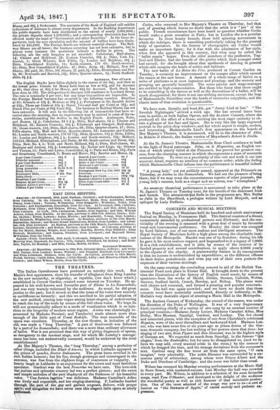CONCERTS AND MUSICAL MEETING& The Royal Society of Musicians held
its hundred-and-ninth anniversary festival on Monday, in Freemasons HalL This festival consists of a dinner, numerously attended by professional persons and dilettanti; and the con- viviality of the evening is seasoned with a great deal of music by favourite vocal and instrumental performers. On Monday the chair was occupied by Lord Saltoun, one of our most zealous and intelligent amateurs. The Royal Society of Musicians holds a high place among the charitable insti- tutions of the Metropolis. Handel was one of its founders: during his life he gave it his most zealous support, and bequeathed to it a legacy of 1,0001. It is a rich establishment, and is able, by means of the interest of its funded property and annual contributions, to apply above 2,0001. yearly to the objects of the charity. A praiseworthy feature in its management is that its income is undiminished by expenditure; as the different offioers do their ditties gratuitously, and even pay out of their own pookets the expenses of their various meetings.
On the same evening, the concluding concert in aid of the Hullah Tes- timonial Fund took place in Exeter Hall. It brought down to the present time the illustrations of the history of English vocal music, by means of specimens from the works of Shield, Dibdin, Storace, Callcott, Webbe, Stevens, Stafford Smith, Crotch, Horsley, and Bishop. The pieces were well chosen and executed, and formed a pleasing and popular entertain- ment. The hall was again crowded; and we have no doubt that these concerts must have materially contributed, directly or indirectly, to Mr. Hullah's very desirable object of erecting a Music Hall in the Metropolis.
The Ancient Concert of Wednesday, the second of the season, was under the direction of the Duke of Wellington. It was of a very iragmentary kind; consisting chiefly of a variety of airs sung by an unusual number of principal vocalists,—Madame Jenny Lutzer, Madame Camden Allan, Miss Dolby, Miss Mossent, Staudigl, Gardoni, and Lockey. The few choral and concerted pieces, with the exception of one from Cherubini's celebrated Requiem, were of the most threadbare and hackneyed kind. Madame Lut- zer, who was here some five or six years ago as prima donna of the Ger- man dramatic company, has lost nothing of her powers since that time: her singing of two airs, from Figaro and .Don Giovanni, was in the highest style of German art. We expected as much from Staudigl, in the famous 4 QUi sdegno," from the Zauberflote; but for once he disappointed us, (and we be lieve we may add, every musical critic in the room,) by the manner in which he dragged the time, and his strange deviations from the composer's text. Gardoni sang the fine tenor air from the same opera, " 0 oars imagine," very admirably. The noble Director was surrounded by a nu- merous party of aristocracy, among whom were Prince Albert and the Duke and Dutchess of Cambridge; and the room was fuller than usuaL Wilson has resumed his Monday evening performances at the Music Hall in Store Street, with unabated success. Last Monday the hall was crowded in every part. Mr. Wilson, in addition to a selection of his most favourite songs, read Tam aShanter; and developed to the delight of the audience the wonderful poetry as well as rich humour of that inimitable produc- tion. One of the most admired of the songs was new to us—a sort of lament on " the Stewarts of Appin," of varied melody and pathetic ex- pression.


























 Previous page
Previous page